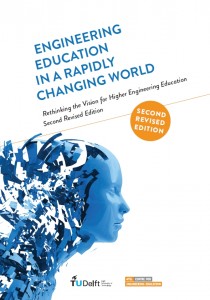“The chief characteristic of the modern world is the scope and speed of change” (Tony Blair)

Last summer I published the 2nd revised edition of my vision on engineering education of the future. With this vision I call higher management, educational leaders, programme coordinators and lecturers to dare look beyond their discipline specialisation at the ever faster changing outside world. We can no longer stick our heads in the sand and refuse to see that both technology and society are fundamentally reshaping the engineering profession.It is obvious that many curricula do not keep up with the changing needs of the job market, no matter whether it is the academic, industrial, or new ventures market.
We are proud of the reputation of the Delft engineers. They are internationally well known for their specialist knowledge, their ability to cooperate in the global world, and their open mind. We are strong in educating research scientists. We can be happy with the education we have, but we also have to think how future proof it is. Young engineering graduates often need stronger skills in for instance creative thinking, systems and holistic thinking, entrepreneurial behaviour, interdisciplinary thinking, and algorithmic thinking. These skills are gaining quickly in importance.
In the past thirty to forty years engineering education has become increasingly engineering science driven. That is a worldwide trend. Ideally speaking, the analytical approaches of engineering science and engineering practice should be balanced and stimulate each other in our education. The trend, however, is that the engineering science component has become much more important than engineering practice and design.This makes that graduates of engineering programmes are not always optimally prepared for their future job and may encounter problems in future when they have to adjust to the fast changes by lifelong learning.
Since 2013 I have immersed myself in the future developments of higher engineering education with a horizon of 2030, at programme level at the faculty of Aerospace Engineering, at institutional level, the four Dutch technical universities, and as a thought leader in the global CDIO network.
Welcome to my blog. My aim is to inform you at regular intervals about developments in higher engineering education and society, and events in my neighbourhood that strike, inspire and fascinate me, and keep me busy in my rethinking of engineering education. Probably they will keep me more than busy, because I expect that we may have to change engineering education more profoundly and rapidly than we have done over the past 40 years.
I hope you will also enjoy the photos I have taken of beautiful sceneries that I will randomly change in the header of my blog.



